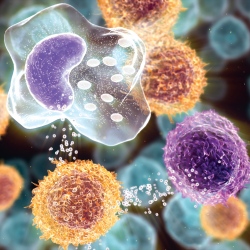
Bradner, a physician and chemical biologist at the Dana-Farber Cancer Institute in Boston, makes defeating cancer sound easy — one just has to play tricks on its memory. “With all the things cancer is trying to do to kill our patient, how does it remember it is cancer?” he asked his rapt TEDx audience. Bradner says that the answer lies in epigenetics, the programmes that manage the genome.
DNA serves as the basic blueprint for all cellular activity, and DNA mutations have long been known to have a role in cancer. But much of a cell’s identity is determined by modifications to chromatin, which comprises DNA and the proteins that bind and package it. Epigenetic instructions, in the form of chemical marks that cling to chromatin, tell cells how to interpret the underlying genetic sequence, defining a cell’s identity as, say, blood or muscle.
Findings over the past ten years have strongly implicated dysregulation of epigenetic instructions in cancer, where growth-driving genes express like crazy and genes that keep cell division in check are silenced. Bradner’s aim is to create a drug that can rewrite those instructions so that cancer cells forget what they are and cease their deadly proliferation.
Bradner thinks that this epigenetic approach could strike down one of cancer’s most treacherous drivers, the DNA-binding protein Myc. Myc is involved in up to 70% of cancers but is generally considered ‘undruggable’, because the active parts of its structure are not accessible to the kinds of small-molecule drugs that chemists generally create. “Myc is one of those things that people dream of targeting,” says Dash Dhanak, head of cancer epigenetics at GlaxoSmithKline (GSK) in Collegeville, Pennsylvania.
Just as audacious is Bradner’s commitment to making his reagents available and his ideas accessible to scientists and laypeople alike, a rare attitude in the highly competitive world of drug discovery. Researchers in Bradner’s lab have developed a compound that interferes with Myc by manipulating epigenetic instructions, and he has sent it out to hundreds of collaborators worldwide. “That’s not common in practice,” says Bradner, “but from first principles, it’s the right thing to do.”
Detractors may scoff at Bradner’s flashy approach, but those who have followed his career say that there is substance to go with the style. “Jay has figured out translational science,” says Stuart Schreiber, director of chemical biology at the Broad Institute in Cambridge, Massachusetts, and Bradner’s former postdoctoral adviser. “He’s really just good at making important discoveries while staying connected to their clinical potential.”
